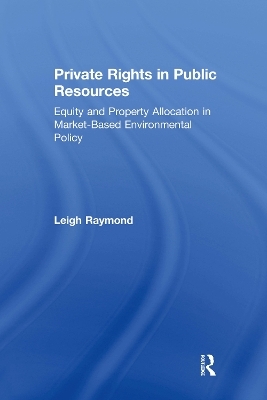
Private Rights in Public Resources
Equity and Property Allocation in Market-Based Environmental Policy
Seiten
2003
Resources for the Future Press (RFF Press) (Verlag)
978-1-891853-69-2 (ISBN)
Resources for the Future Press (RFF Press) (Verlag)
978-1-891853-69-2 (ISBN)
Confirming that much of the debate in the selected policies centers on the equity or fairness of the initial allocation of property rights, the author applies the theories of John Locke, Morris Cohen, and others to build a framework for identifying the competing norms of equity in play.
Privatizing public resources by creating stronger property rights, including so-called rights to pollute, is an increasingly popular environmental policy option. While advocates of this type of market-based environmental policy tend to focus on its efficiency and ecological implications, such policies also raise important considerations of equity and distributive justice. Private Rights in Public Resources confronts these ethical implications directly, balancing political theory and philosophy with detailed analysis of the politics surrounding three important policy instruments--the Kyoto Protocol, the 1990 Clean Air Act Amendments, and the 1934 Taylor Grazing Act. Author Leigh Raymond reviews legislative records and administrative documents and interviews key policymakers. Confirming that much of the debate in the selected policies centers on the equity or fairness of the initial allocation of property rights, he applies the theories of John Locke, Morris Cohen, and others to build a framework for identifying the competing norms of equity in play. Raymond's study reveals that, despite the different historical and ecological settings, the political actors struggled to reconcile similar arguments-and were often able to achieve a similar synthesis of conflicting ownership ideas. Rather than offering a familiar argument for or against these policies on ethical grounds, the book explains how ideas about equity help determine a policy's political fate. Shedding light on the complex equity principles used to shape and evaluate these controversial initiatives, this empirical analysis will be of interest to those on all sides of the debate over market-based policies, as well as those interested in the role of normative principles in politics more generally.
Privatizing public resources by creating stronger property rights, including so-called rights to pollute, is an increasingly popular environmental policy option. While advocates of this type of market-based environmental policy tend to focus on its efficiency and ecological implications, such policies also raise important considerations of equity and distributive justice. Private Rights in Public Resources confronts these ethical implications directly, balancing political theory and philosophy with detailed analysis of the politics surrounding three important policy instruments--the Kyoto Protocol, the 1990 Clean Air Act Amendments, and the 1934 Taylor Grazing Act. Author Leigh Raymond reviews legislative records and administrative documents and interviews key policymakers. Confirming that much of the debate in the selected policies centers on the equity or fairness of the initial allocation of property rights, he applies the theories of John Locke, Morris Cohen, and others to build a framework for identifying the competing norms of equity in play. Raymond's study reveals that, despite the different historical and ecological settings, the political actors struggled to reconcile similar arguments-and were often able to achieve a similar synthesis of conflicting ownership ideas. Rather than offering a familiar argument for or against these policies on ethical grounds, the book explains how ideas about equity help determine a policy's political fate. Shedding light on the complex equity principles used to shape and evaluate these controversial initiatives, this empirical analysis will be of interest to those on all sides of the debate over market-based policies, as well as those interested in the role of normative principles in politics more generally.
Leigh Raymond is an assistant professor of political science at Purdue University. His articles about property rights, localism, and environmental policy have appeared in Ecology Law Quarterly, Natural Resources Journal, Policy Sciences, and Science.
Introduction: Equity Norms in Environmental Policy
1. Licensed Property and Alternatives to the 'Gavel Theory' of Fairness in Public Policy
2. A Property Theory Framework
3. The Present: SO2 Emission Allowances, 1989-2002
4. The Past: Public Lands Grazing, 1934-1938
5. The Future: Allocating 'Extra-National' Resources
6. Conclusion: The Case for Equity Revisited
Bibliography
| Erscheint lt. Verlag | 23.10.2003 |
|---|---|
| Verlagsort | Washington |
| Sprache | englisch |
| Maße | 152 x 229 mm |
| Gewicht | 900 g |
| Themenwelt | Naturwissenschaften ► Biologie ► Ökologie / Naturschutz |
| Sozialwissenschaften ► Politik / Verwaltung ► Politische Theorie | |
| Wirtschaft ► Volkswirtschaftslehre | |
| ISBN-10 | 1-891853-69-4 / 1891853694 |
| ISBN-13 | 978-1-891853-69-2 / 9781891853692 |
| Zustand | Neuware |
| Haben Sie eine Frage zum Produkt? |
Mehr entdecken
aus dem Bereich
aus dem Bereich


